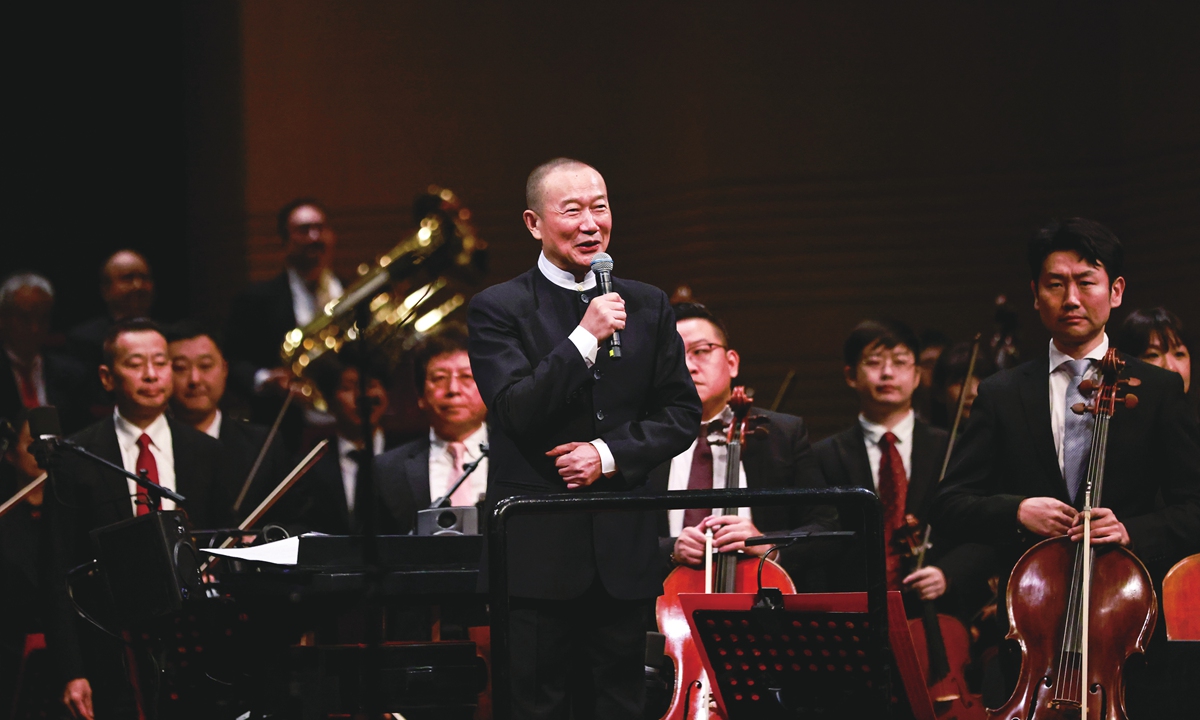ARTS / THEATER
Tan Dun talks about martial arts, music as conductor of his ‘Martial Arts Trilogy’ in Beijing

Tan Dun during his performance at the Poly Theater in Beijing Photo: Courtesy of Tan Dun
It may not be the most well-known music piece from Oscar-winning musician Tan Dun, but it is probably his most practiced one as he and his Martial Arts Trilogy in Sight and Sound has been touring around in the world since the album was released in 2011.
Each performance, including Friday night's performance at the Poly Theater as part of the Beijing Music Festival, always brings something new and fresh as "music and martial arts can share dreams and hopes."
"We shall never underestimate the power of music," the renowned conductor and composer, who won the Academy Award for writing the score to Ang Lee's Crouching Tiger, Hidden Dragon (2000), told the Global Times on Friday.
Tan's Martial Arts Trilogy tells three stories of love and death through wordless music and a movie presentation: the violinist in director Zhang Yimou's Hero (2002) loses her life for the sake of love; the cellist in Ang Lee's Crouching Tiger, Hidden Dragon, sacrifices her life for the dream of pursuing martial arts; and the pianist in director Feng Xiaogang's Banquet (2006) dies for revenge and desire.
During the all night Sound Visual Drama, the audiences watch and hear the three solo characters tell their tales across time and resurrection through similar motifs of rhythm, timbre and melody - similar to how Wagner's The Ring Cycle - that repeat and echo each other.
At the end, Water, the god of life and freedom, decides to grant the three beautiful humans new lives in the human world once more.
"Why? Because the world needs love and music, very urgently," said the conductor, who shared the stage with violinist Daniel Hope, cellist Nie Jiapeng and pianist Sun Jiayi.
"Practicing the martial arts is the art of balance between friendship, yin and yang, the landscape, men and women; the art of being a human being, and the art of living. This is why Chinese martial arts has fascinated the whole world since ancient times. This is also the shining point I learned from martial arts culture, and then integrated it into my creation," he said.
The Friday night performance also marked Hope's first visit to China since the pandemic.
"It's so nice to be back in China after being too long away from here," he said.
"Music is always something that connects with people of all nationalities and religions."
He recalled his first cooperation with Tan in Amsterdam. Both of them arrived very late and had no opportunity to discuss the piece.
"So we went straight into the rehearsal in front of the orchestra. We never met before. We played the whole thing without stopping. And in the end, we both looked at each other in complete amazement."
Both Tan and Daniel agreed that "that's what music is about, getting rid of boundaries and getting rid of differences."
"We are all related as musicians and we all have the chance to share our dreams, our hopes and everything. What's in this piece is what's in our lives and what's in our DNA and I think it is the best possible way to bring that all together," added Hope.


